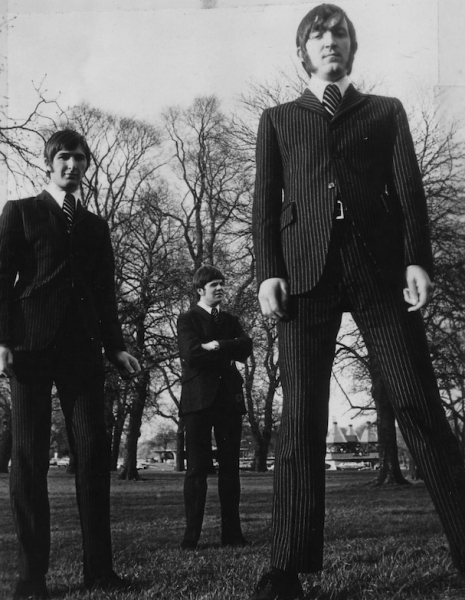
Revolution starts with a solitary idea that only builds into purpose when shared with others. In early 1967 three Scotsmen started a revolution when they played a legendary residency at the Marquee club in London. The trio was Ian Ellis (bass and lead vocals), Harry Hughes (drums) and a maverick keyboard player Billy Ritchie. Together they were called 1-2-3.
As a band 1-2-3 had a short lifespan—lasting around two years from 1965-1967. Yet, their impact—their musical idea—was remarkable as it spawned a whole new musical genre called Prog Rock. At the heart of their success was the unique talents of keyboard wizard Ritchie who invented this strange new soundscape that influenced the likes of Keith Emerson, Greg Lake, the Moody Blues, Jon Anderson, and Robert Fripp. Among their fans was Jimi Hendrix and a young David Bowie who wrote a letter highlighting this new sound to the music press.
1-2-3 were loved by musicians but loathed by some of their “hippie” audience. Their impact was immediate. They were signed by Beatles manager Brian Epstein to his talent group NEMS—but his untimely death in August 1967 left 1-2-3 open to the fickle fate of the music business. While other musicians quickly adopted and adapted 1-2-3’s musical style, Ritchie and co. were left to languish by new management who did not know what to do with them.
Eventually 1-2-3 signed a new record deal with Chrysalis Records in 1968. Chrysalis wanted the band to change its name and fit in more with their label. 1-2-3 became Clouds and their unique trademark sound was distilled to fit better with the label’s roster. Three albums and two world tours followed—but it was all too late—The Nice had pinched their act and King Crimson and Yes were already on the horizon.
In the 1990s, David Bowie once again enthused about seeing 1-2-3 play in 1967. It led to renewed interest in the band and their follow-on Clouds.
Not so long ago, I wrote on this site about Billy Ritchie and his creation of Prog Rock. This led to contact with Ritchie who agreed to an exclusive interview with Dangerous Minds. I wanted to know more about the man who had started a revolution and what that had led to.
I started off by asking Ritchie about his earliest memories, his childhood and first interest in music.
Billy Ritchie: My earliest memory is of going to the local school, it seemed a daunting prospect, a rough place, I was faced with aggression, but my response to that was to override my sensitivity and fight for my place, I even gained a reputation as being tough, when I was actually a sensitive soul—just good at covering that up, and dealing with adversity head on, but of course, it all had an effect on me, made me very tense and vigilant, never relaxed. I didn’t have any thoughts about music at all ‘till much later.
I was the first of six children. I was followed by two sisters, Catherine and Grace, then a brother, George (who died two years ago); then another sister, Elizabeth, then a brother Brian, who was born when I was fifteen.
My childhood seems, in hindsight, to have been stressful, though I have also memories of cowboys and Indians, then playing football in the streets – no cars in those days at all. I fought with my sisters a lot – doesn’t everyone? – there was great sibling resentment on my part, and probably theirs as well. As a young teenager, I built model planes, and dreamed of being a pilot. I also used to pray that I could be Superman, and astound everyone by flying.
When did you start taking an interest in playing music?
There weren’t many instruments that were deemed respectable in that society, just accordion mainly, though harmonica was OK to play on coach trips etc. I think that I just wanted to be accepted, or maybe to stand out in some way. I certainly didn’t play because of enjoyment, it meant nothing that way. Most guys played in a vamping style with the tune heavily disguised and swamped by the “chords” (as far as I was concerned anyway). I didn’t like the mess of that – without knowing it, I was already making musical discriminations – so I gravitated towards the Larry Adler/Tommy Reilly kind of playing, using a Super Chrominica (that could play half-notes).
Most people around me frowned on all that – perhaps it seemed too pretentious, but I was happier with that clean sound. I played anything that I thought people would like. I remember a school concert with me playing “Danny Boy.” I was pleased with myself, but people weren’t impressed because there was no vamping, so I ended up disgruntled and a bit resentful. When I calmed down I thought I must be no good at it when people didn’t react. I had no thoughts at all about writing songs or even considering if I was any good at any of that. I suppose I was trying to impress my peers any way I could. I wanted to be a great football player, because that’s what seemed to impress everyone most.
Which musicians did you like?
I didn’t have any thoughts at all about music or music artists, I found it boring when my friends got excited about their heroes, like Elvis or Buddy Holly etc. Sometimes I tried to go along with their conversations, so I wouldn’t be an outsider, but I really couldn’t see what the fuss was about, it didn’t mean anything to me. I didn’t have any thoughts or influences, none of that was relevant at the time.
When did you start playing keyboards?
When I was about eight, a neighbor threw out a piano, because no-one had managed to play it, I think. My parents took it in because it was something for nothing. For the first week or two, all five of us children banged at the piano all at the same time, so I gave up and let them, I couldn’t stand the discordant noise—always hated jams and tuning up sessions where everyone plays at once, making an awful racket!
When my siblings all gave up and got fed up with the piano, I crept back and began to see what I could do with it. I played by following my instincts about what was right and what was wrong.
What was unusual (without me knowing it) was that I also wanted to know why I was playing the sounds, how it worked as well as making it work. But I didn’t think anything of it, and never had any thoughts about whether what I was doing was any good or not, it wasn’t important enough to me, it was just something to do when there was nothing else, no different to building model airplanes, in fact, not as interesting.
I got bored with things easy, so I found that when I was at a loose end, I could fiddle around with the piano, trying to play things, finding out how music worked, it was a kind of curiosity as much as anything. The background accompaniment was everyone in the house shouting at me to “pack it in”! Good practice for the music business!
The Satellites.
When did you first join a band?
I was fifteen when my friends decided to form a band called The Satellites and become rich and famous. As they were talking about it, I was feeling a bit of panic, wondering how I could fit into all this – it was all about guitars.
My best friend Flam (Robert Fleming) played a bit of guitar (he ended up making a living from it), Jim Stark was in the pipe band, another friend, Duncan Blair was keen to try playing bass, and Jonny Moffat fancied himself as a singer. Jim said “What are you doing to do Wullie?” All eyes on me. “I’ll play electric organ” I blurted out. I could see the others were asking themselves what the hell that was. I don’t know to this day why I said that, it just came into my head.
I felt a bit of a fraud, the Pete Shotton of the band. My main contribution was suggesting my cousin, William Ritchie (“Big Wull”) to play lead guitar, as he had a Futurama and had been taking guitar lessons.
When we got to the first rehearsal, the others were struggling to learn a song, and I was a bit puzzled, it seemed easy to me. I played the whole thing, and my friend’s faces were a picture. I suddenly realized I was good – very good. It changed everything.
What were your first performances like?
The first thing I learned about doing gigs is that you can rehearse all you want, but it doesn’t teach you anything about playing on a stage in front of an audience. So that was a big leap.
The others were scared, but I felt confident, I knew what I was doing, I could feel what had to be done to make things work, even though I had never done it before. I wasn’t so much inspired as exhilarated to be in control and ahead of everyone else, it gave me great confidence.
Before the advent of the band, I had never even thought about being a musician, it didn’t mean anything to me. If my friends hadn’t decided to form a band, I doubt that I would ever have taken the path I did.
Ironically, I never got the same feelings from music that they did, and I was only ever interested in my own music, not anyone else’s. It’s only recently that I’ve realized that this attitude – as bad as it is in some ways – is the reason I “invented Prog.”
I had no influences or attitudes about what I should play, it was all up for grabs as far as I was concerned, I had no barriers and no important influences looking over my shoulder.
When it finally came to 1-2-3, I had a creative freedom that no-one else I knew had. That opened the doors to all that followed.
The early sixties seemed optimistic, like something was waiting to happen. That was even true in the outposts where we lived. Soon after we formed the band, there was the coming of The Beatles, and a new era definitely arriving. The music culture was linked inextricably to the social culture too, everything seemed part of an upward step. Even for a natural pessimist like me, anything seemed at least possible.
You mentioned 1-2-3, can you tell me how you came to join that band?
After a disgraceful redundancy in my first job, I landed another job in an office, and there I met Archie Colquhoun, who was to play a big part in the first days of 1-2-3. He knew Ian Ellis and Harry Hughes, who had a band called The Premiers, and they were thinking about having an organist in the band. Archie (typically) said he knew where the best organist in Britain was, and put me forward.
I didn’t really want to know, as the guys were dead snooty about it all, especially when they knew I came from Forth, which was considered the home of “The Sheep Men.” They were thinking they would be doing me a favor, when I thought it was the other way round.
I had no intention of joining them. But when I heard them play, I realized they were miles more professional than The Satellites, so I agreed to a rehearsal.
At the rehearsal, the same thing happened as at The Satellites first get-together, I played a song from scratch, and they were hooked, even though they thought my equipment was embarrassing—a linear amp in a wooden box, and a Hohner clavinet on stilts so I could stand and play. They all had shiny Selmer amps with little green lights flickering in a row. They called my amp “the blue box” because it had blue vinyl covering the wood. They said “That fucking blue box is messing up our look!”
Within weeks of my joining, the lead guitarist, Derek Stark left, feeling overshadowed by the organ. For a year or two, we played all the main Scottish gigs, supporting The Kinks one night in Edinburgh.
After a trip to London with Cyril Stapleton the band leader didn’t achieve anything, the band broke up, but after a few months, Ian and Harry and I decided to form a trio, and from that, 1-2-3 was born.
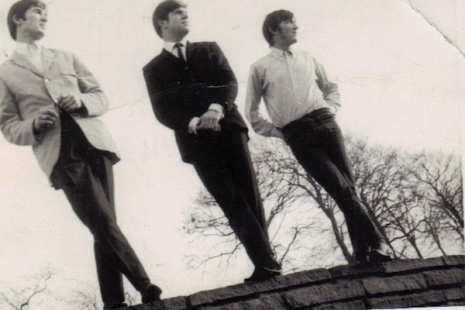
The original Prog Rock band 1-2-3.
Billy Ritchie: When 1-2-3 began playing, we quickly found that we divided opinion in the audience.
Half would hate us, and the other half—usually other musicians—would be delirious with shock and joy. We thought Scotland must be too square for us, and thought we could find acceptance in hip London, but when we got there, we found exactly the same equation.
That was to be the situation for all of 1-2-3’s short life.
How did you get the residency at the Marquee club in London?
It was Archie who talked John Gee into giving us an audition. What we didn’t know at the time was that John was a musical snob, he thought “pop/rock” was rubbish. He loved jazz, to him, that was “proper” music.
When he heard us, he thought he had found the missing link, a pop band that played like a jazz band. He got people like Chris Barber down to hear us and sit in with us.
The gigs themselves were chaotic and revolutionary.
As in Scotland, half the audience were furious, fights were breaking out everywhere throughout the club, the other half—musicians—were ecstatic.
John came on stage a couple of times to restore calm. Being John, he had to say “If you want boring R & B, I suggest you fuck off to the 100 Club in Oxford Street”.
The atmosphere was electric. On our first gig, Roger Chapman of Family came into the dressing room—“Great stuff guys, but you’ll never get away with it”.
People like Robert Fripp and Keith Emerson would buttonhole us after the gigs, and Jon Anderson was always hanging about us asking questions and making comments about the music. Not just at The Marquee, but all over the country, 1-2-3 caused the same reaction. Quite often other musicians would be in tears, or hysterical, it was that radical, so different.
We knew we had made a fuss, people from the music business were drawn there to see us, Pete Townshend (as he mentions in his autobiography), and of course, Brian Epstein saw us and signed us up.
We were quite blasé about it all, being young, we thought it was our due! We also felt like we were “making it.” One big regret is not taking a photo of the lifesize picture of 1-2-3 in the Marquee foyer.
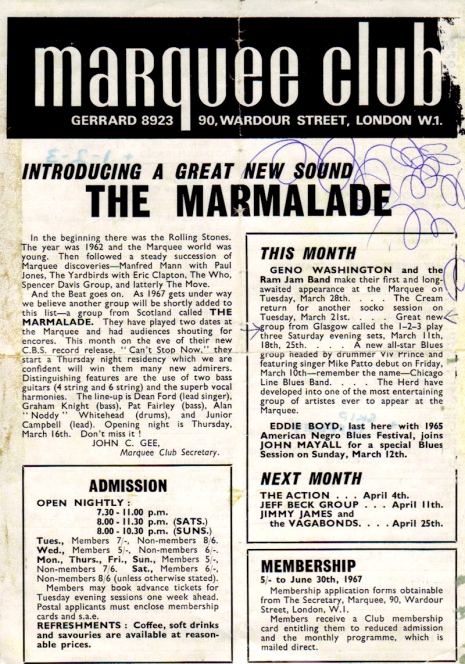
1-2-3 listed as ‘a great new group from Glasgow’ in this advert for the Marquee.
Did you know you were creating a new sound?
The sound took care of itself, we knew it was unique at the time, we were the first true Rock organ trio.
Other organ trios soon existed, but they were often more swing/jazz based, the organs were not played in a rock style, the music was soft, not rock. Organ had always been a background instrument until then, guitars led the field on stage till I came along.
Then came the music itself. It was a completely different concept from any other band at that time, that approach would still sound unique today. The arrangements were so radical, and each song had its own character, the band was not defined by any one song. Each song was merely an aspect of a band that took many forms and had no limits. Though all those other bands tried to copy us, it still didn’t end up anything like 1-2-3, all they took was the concept of music that sounded more like film tracks than three-minute songs.
What keyboards did you play and how did this change?
I began with a Gamages mini-keys organ, and then quickly to a Hohner Clavinet that my cousin put on stilts so I could stand and play rather than sit. When I joined the Premiers I graduated to a Vox Continental, then a Hammond M102.
Eventually, my instrument of choice was a Hammond C3. I had the biggest organ sound ever heard on a stage.
I also played everything like two right hands, two organists at once, it made the sound very powerful, octave or harmony solos, left hand as fast as the right.
Till I hit the stage, organs had always been background instruments, but I had no intention of being behind anyone, I wanted to be in front, be the leader.
Most organists then, and even much later (including Keith Emerson) were heavily influenced by the famous jazz organists like Jimmy Smith and Jimmy McGriff, but I didn’t like the way the Jimmys and others played, it definitely wasn’t rock! I approached it all completely differently, I wasn’t influenced by anyone, I just played it all as I saw it, and made sure every note counted. I intended to blow any guitarist off the stage.
Rick Wakeman said recently that until synths came along, keyboard players couldn’t get in front of guitarists – that wasn’t true when it came to me – I didn’t do background for anybody.
1-2-3 ‘have created an entirely new sound in pop group music.’
How did you get signed with The Beatles manager Brian Epstein?
The fuss we made at The Marquee brought many people down to see us, and Brian Epstein was one of them. He was smooth and charming, and almost aloof/superior. But then, he was The Beatles manager, so we expected that or saw it as his right. We weren’t overawed though. As I said, at that age, we thought it was our right too!
He said: “Sophisticated music must be presented in sophisticated clothes” and dressed us in pin-stripe suits with smart cravats. We looked a lot like The Jam did, only decades later. We thought nothing of it at the time, but in hindsight, it’s intriguing to wonder what he might’ve made of it all. He certainly seemed to understand something that others didn’t, perhaps that’s why he put us on that concert with Jimi Hendrix. Makes you wonder what might have happened had he lived long enough to do something about it.
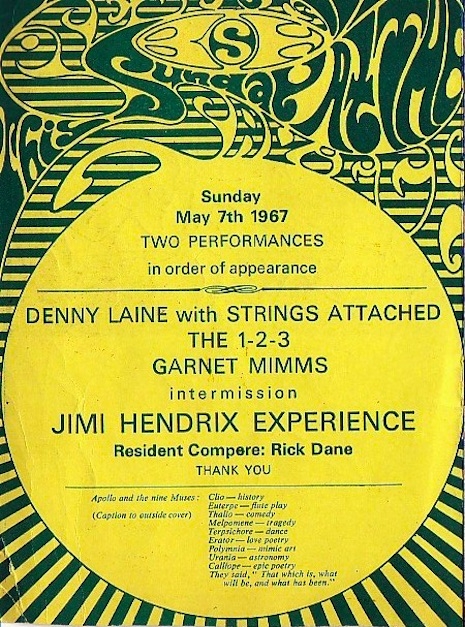
1-2-3 on the bill with Hendrix.
1-2-3’s residency at the Marquee in early 1967 introduced Prog Rock to the world and changed music. Can you tell me more about the response from other musicians?
It wasn’t just the residency at The Marquee – though that was obviously the most important and highest profile. As I said, the same thing happened all over the country, wild reactions and shock from other musicians and clued-in punters, hate and fury from the average punter, which should have told us something!
At The Marquee, as I said, it was Keith Emerson, Robert Fripp, Jon Anderson (not Ian Anderson, that connection came much later). I think the Moody Blues saw us when we were staying in Birmingham for a couple of months in a house rented for us by NEMS. I was friendly with Jeff Lynne (who was in The Idle Race at the time) and Bev Bevan (of The Move at that time) was a big fan. The Beatles in general never saw us play, but Paul McCartney used to see us at The Pheasantry club in Kings Road, Chelsea. His girlfriend Maggie was a waitress there. The DJ was John Anthony, who later produced Genesis and others. At the time of The Marquee, we seemed like we were at the centre of the storm.
What other musicians understood for the first time when they heard us was that songs didn’t have to be done in the format presented on a record.
Not only that, you could have different sections, different tempi, different forms of music all in the same piece. You could have inspirational playing and great melody at the same time. To The Nice/ELP, the concept of a rock organ trio playing classics previously reserved for orchestra and the Royal Festival Hall; to King Crimson, the concept of a song like “21st Century Schizoid Man”; to Yes, in particular, the idea of a band without any musical barriers and so on and so on…..
We didn’t know we were pioneering a whole new sound and movement as such, but we knew we were out there on our own in terms of creativity and power, there was nothing like 1-2-3 before or since.
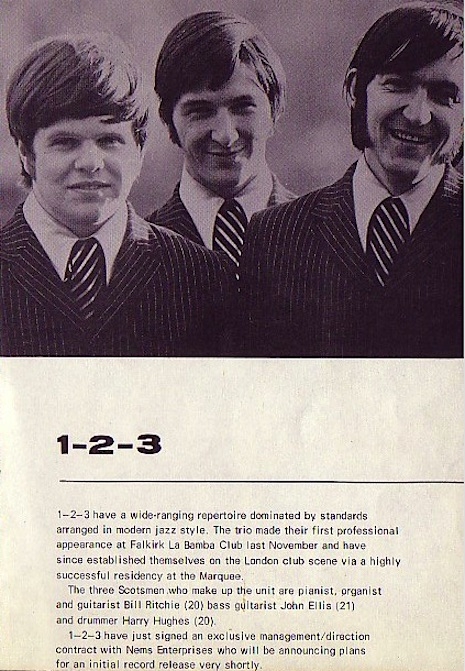
1-2-3 signed Brian Epstein’s NEMS management in 1967—what could possibly go wrong?
What happened to 1-2-3 after you signed for NEMS?
Only a couple of months after signing us, Brian Epstein died, and we were left in the hands of Robert Stigwood, who had just signed The Bee-Gees, and already managed Cream.
He didn’t know what to do with us, we were so different from any other band. He sent us on a cabaret tour between fire-eaters and jugglers. That tells you everything you need to know. He lost us our advantage.
How did 1-2-3 change into the band called Clouds?
After Brian Epstein died, and we left NEMS and Stigwood behind, we played some faceless gigs and fell by the wayside till Terry Ellis saw us in a club in Ilford called the Golden Glove.
Chrysalis didn’t exist then, it was only Terry and his partner Chris Wright in a tiny office in Regent Street. Chris managed Ten Years After, who were just beginning to make a name for themselves. Terry wanted his own band, and signed us. He insisted we change the name to Clouds – I hated that name, and I was right, 1-2-3 would have weathered the storm so much better.
He also insisted that the 1-2-3 too-clever-by-half material would have to be scrapped. The only song we were allowed to keep was “Sing-Sing-Sing,” because it was Harry’s drum solo. We never played any 1-2-3 material again, including “America,” which was seized on by Yes as a concept they used (though nowhere near as good in my opinion).
David Bowie used the concept of the middle section of our “America” as the opener in his “Concert for New York” appearance.
Bowie was a major fan of 1-2-3. He wrote a letter to the music press which hailed the group as ‘three thistle and haggis-voiced bairns had the audacity to face a mob of self-opinionated hippies, with a brand of unique pop music, which, because of its intolerance of mediocrity floated as would a Hogarth cartoon in [the children’s comic book] Beano.’
It’s quite funny for me to try and deal with all this Bowie thing now. A bit frustrating too, as people seem to think how privileged I was to know him, when in actual fact, at the time, it was him who wanted to know me!
He was bright, clever, a good conversationalist, we got on like a house on fire, though at the time, I thought of him essentially as a young gofer.
I met him first in Dundee when The Premiers were doing a gig with Johnny Kidd and The Pirates, and David’s band were also supporting. We got on, and vowed to meet in London when we eventually got there.
He came down The Marquee when he heard about us doing his song, and we quickly renewed our acquaintance.
When we played the Savile Theatre, I introduced David to Jimi Hendrix, something that has gone down in folklore and legend , as witness the V & A exhibition, where Japanese tourists are trailed round the capital and stood outside the site of The Savile Theatre, then told “This is where Billy Ritchie introduced David to Jimi Hendrix”. I find it quite amusing/bemusing. It seemed no big deal at the time. I similarly shocked Ian Anderson very recently when I told him that David had been in our dressing room (with Jethro Tull and Ten Years After at The Royal Albert Hall). Ian said “I don’t remember that!” But of course, he wouldn’t. David was just a bloke then, not the famous Thin White Duke…..
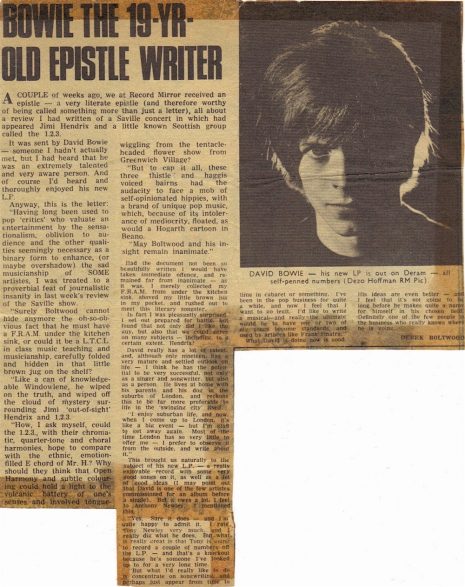
David Bowie’s fan letter about 1-2-3 as sent to the Record Mirror.
Now renamed Clouds you started recording your first album ‘The Clouds Scrapbook’—what happened and what was the response?
Terry Ellis asked if we had any of our own songs. I said I had hundreds of songs and I played him some. His eyes lit up. He loved the songs even more than the band. The problem was, the songs were nothing like the band, so we immediately had a problem combining the two.
Terry’s first solution was The Clouds Scrapbook. Basically, the album contains some of my songs done purely as songs, and some bit and pieces of Clouds-type muso playing, a real eclectic mix.
We were babes in the woods in recording terms, so we generally just did what we were told. Even in “Waiter,” David (now Dee) Palmer asked Terry if he could persuade us to let the orchestra organist, drummer, and bass player play instead of us, for the sake of continuity. We of course refused, and did it ourselves, though it meant that because of cost, we could only have two takes ‘live’ with the orchestra.
Several of the other songs, David Palmer handed me different chords for my own songs! But the orchestra was there, so it was fait accompli. It was a learning process for us. But the album was very well received by critics, Melody Maker gave it the Album of the Month award. A famous singer of that time, Clodagh Rogers, recorded the song “Scrapbook.” Ian Anderson took a line from “Scrapbook” (“I’m living in the past I’m so confused”) to create his own song “Living in the Past.”
The big disappointment for us at the time was that the album pressing was faulty on vinyl, and ruined the sound, making it muffled. You can hear the proper full sound on the new CDs now, but forty years too late to have the impact they should have had at the time.
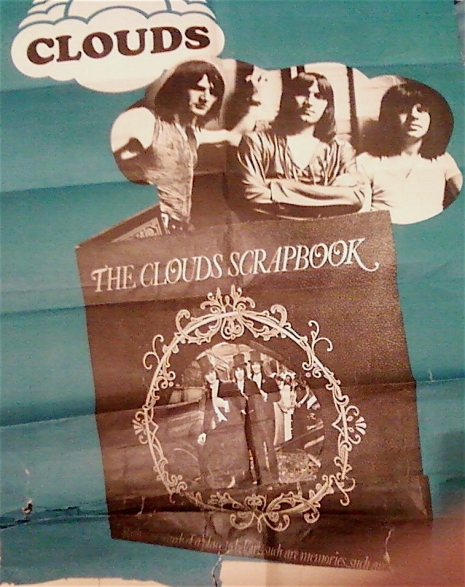
Clouds went on to record two further albums ‘Up Above Our Heads’ and ‘Watercolour Days’—can you talk about this and what was the response?
We got a lot of flak for The Clouds Scrapbook not sounding like the band on stage, and we were frustrated by that too, so when we did Up Above Our Heads. We insisted that the record should feature more of the band on stage than the previous album. Unfortunately, the pendulum swung too far back the other way, and the album suffered from a lack of true songs, although it showed more clearly the musicianship of the band.
The best new song on the album was “In the Mine” which wasn’t, of course, a Clouds song at all. It was a Billy Ritchie song. Some of the other songs showed my efforts at trying to write a Clouds song, but it was a struggle. I couldn’t get my head around writing a song then arranging it, I had always found it easy to arrange other people’s songs, but not my own, having written them already, I couldn’t see the alternative angles as I had during the 1-2-3 era.
The best Clouds song on that album was probably “Imagine Me,” but the Clouds’ songs were still struggling to find their feet.
Clouds seemed to be a be coming together as a different band from 1-2-3 by the time of your third album ‘Watercolour Days’—there are some great songs on this album.
Watercolour Days was a better attempt by us to find our way forward, probably because we were left alone most of the time. And I was beginning to get to grips with writing Clouds songs rather than my own.
“Watercolour Days” was without doubt the best Clouds song I ever wrote, though it’s not nearly as good as most of my own songs. I also liked “Long Time” and “I am the Melody” (which had a much better version on stage than on the record). “Cold Sweat” wasn’t a great song (written by Ian, with a bridge from me), but it was a good track, and sounded very like the band on stage at that point, you can begin to hear the power of the real band. We should have made a live album.
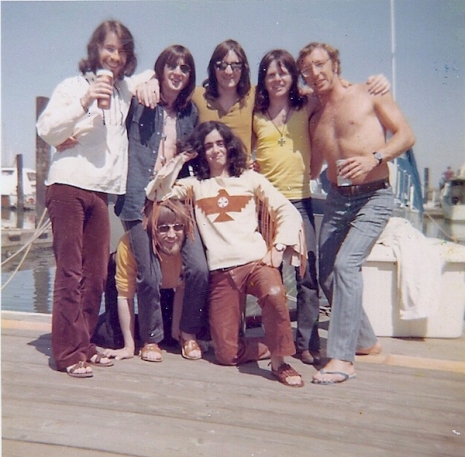
Clouds on tour in America.
Why did Clouds call it a day?
Our first America tour was such a triumph, we had storming concerts and fantastic reviews. That should have been enough to ensure our success, but Terry was too busy with Jethro Tull and building Chrysalis to take care of us, and it was allowed to falter. Our record wasn’t released on time, and our moment was gone.
Terry and I fell out, and although we did a second tour, which was something of shambles, thanks to Chrysalis’ ineptitude and business problems with their former tour agency, Premier Talent. After the tour, things went from bad to worse, and we left Chrysalis, despite Terry offering me my own publishing company.
We struggled on by ourselves for a few months, but I decided I had to get out of the music business, and ended it all by kicking all my equipment off the stage one night in Stoke-on-Trent. I rode the piano off the stage like the man riding the Atomic bomb out of the plane in Dr. Strangelove. Then I walked out of the hall in mid-concert, leaving all my gear behind, and vanished from the music business forever.
Billy Ritchie disappeared. 1-2-3 and Clouds were forgotten as new era of prog rockers and glam rockers took over. Years later, when David Bowie again talked about his love of 1-2-3, a younger generation soon rediscovered the pioneering keyboard talent of Billy Ritchie. This in turn led to the re-release of Clouds’ three albums. It may not have been the heights of what 1-2-3 might have been able to do onstage, but it gave a taste of what had been lost.
Previously on Dangerous Minds:
Meet the Father of Prog Rock.